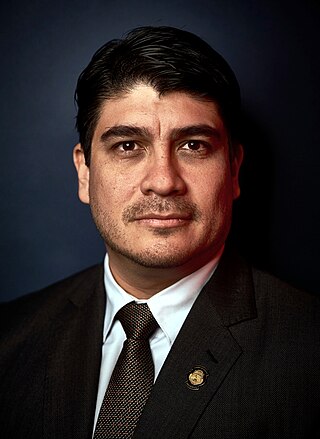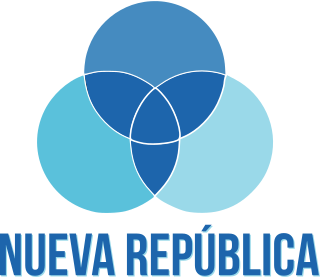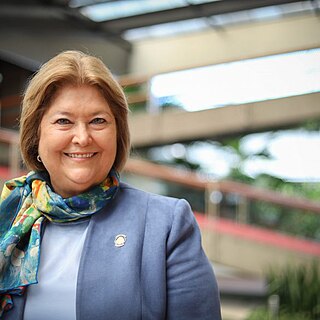
The politics of Costa Rica take place in a framework of a presidential,representative democratic republic,with a multi-party system. Executive power is exercised by the president and their cabinet,and the President of Costa Rica is both the head of state and head of government. Legislative power is vested in the Legislative Assembly. The president and 57 Legislative Assembly deputies are elected for four-year terms. The judiciary operates independently from the executive and the legislature,but is involved in the political process. Costa Rica has a strong system of constitutional checks and balances. Voting is compulsory,but this is not enforced.

The Libertarian Movement Party is a political party based on libertarian conservatism in Costa Rica. It was founded in May 1994. After an important protagonism during early 2000s with its perennial nominee Otto Guevara among the main candidates and reaching third place in 2006 and 2010,it was affected by several corruption scandals and lack of funds,the party gradually suffered a debacle in 2014 ending in fourth on the presidential ticket,and fifth in Parliament. Later losing all its mayors in the mid-term local election of 2016,to finally having bad results in 2018 with Guevara's candidacy reaching only 1% of support and losing all seats in Congress.

The National Liberation Party,nicknamed the verdiblancos,is a political party in Costa Rica. The party is a member of the Socialist International. Social-democratic by statute,the party has a few internal factions,including liberals,Third Way supporters,centrists,and social conservatives.

The Citizens' Action Party is a political party in Costa Rica.
Same-sex marriage has been legal in Costa Rica since May 26,2020 as a result of a ruling by the Supreme Court of Justice. Costa Rica was the first country in Central America to recognize and perform same-sex marriages.

Epsy Alejandra Campbell Barr is a Costa Rican politician and economist who served as the Vice-president of Costa Rica from 8 May 2018 to 8 May 2022. She is the first woman of African descent to be vice president in Costa Rica and in Latin America.

The third primary election of the Citizens' Action Party was scheduled for July 9,2017 in order to elect PAC's presidential candidate for the 2018 Costa Rican general election. Albeit rumors about possible candidates included former candidate and former deputy Ottón Solís,then Vice-President Ana Helena Chacón and former president of Congress and then UN ambassador Juan Carlos Mendoza,all of them denied having aspirations at the moment. Instead,the first announcing his intention to be nominated was Minister Carlos Alvarado,former Minister of Social Issues and President of the Joint Social Welfare Institute and latter Minister of Labor under Luis Guillermo Solis' presidency. He was quickly followed by Economy Minister Welmer Ramos,both resigning their offices as the Constitution requires before February 2017. Congresswoman and former pre-candidate Epsy Campbell made her intentions public on March of the same year in what could have been Campbell's third attempt to be presidential nominee. But on March 27 Campbell withdraw from the race.

Carlos Andrés Alvarado Quesada is a Costa Rican politician,writer,journalist,and political scientist who served as the 48th president of Costa Rica from 8 May 2018 to 8 May 2022. A member of the Citizens' Action Party (PAC),Alvarado previously served as Minister of Labor and Social Security during the presidency of Luis Guillermo Solís.

General elections were held in Costa Rica in 2018 to elect both the President and Legislative Assembly. The first round of the presidential election was held on 4 February 2018,with the two highest-ranked candidates being Christian singer and Congressman Fabricio Alvarado Muñoz from the conservative National Restoration Party and writer and former Minister Carlos Alvarado Quesada from the progressive Citizens' Action Party,gaining 24% and 21% of the votes respectively. As no candidate received more than 40% of the first round vote,a second round run-off election was held on 1 April 2018 and was won by Carlos Alvarado Quesada,with a landslide victory of 60.6% of the vote.

The New Republic Party is a Costa Rican Christian-conservative political party founded on 20 October 2018. The party was founded after the resignation of the evangelical singer and journalist Fabricio Alvarado Muñoz from the Christian party National Restoration for disagreements with the Executive Committee chaired by Congressman Carlos Avendaño. Alvarado was the latter's presidential candidate in the 2018 elections of major significance,since he was the most voted in the first round with 25% of the votes,qualifying for the run-off,but was defeated by the Citizen's Action Party nominee Carlos Alvarado Quesada.
Eduardo Octavio Trejos Lalli is a Costa Rican internationalist,private consultant and politician. Trejos is the current Costa Rican representative in the Central American Bank for Economic Integration. Trejos was also Director of National Intelligence and Security and has held the position of Deputy Foreign Minister,interim Foreign Minister and Ambassador of Costa Rica to Nicaragua

Ana Patricia Mora Castellanos is a Costa Rican sociologist,university professor,and politician.

The COVID-19 pandemic in Costa Rica was a part of the ongoing worldwide pandemic of coronavirus disease 2019 caused by severe acute respiratory syndrome coronavirus 2. The virus was confirmed to have spread to Costa Rica on 6 March 2020,after a 49-year-old woman tourist from New York,United States,tested positive for the virus.
Marcia González Aguiluz is a Costa Rican politician and lawyer who served as the Minister of Justice and Peace under President Carlos Alvarado Quesada between 2018 and 2020.

General elections were held in Costa Rica on 6 February 2022,to elect the president,two vice-presidents,and all 57 deputies of the Legislative Assembly. As none of the presidential nominees obtained at least 40% of the votes,a runoff was held on 3 April 2022,between the top two candidates,JoséMaría Figueres and Rodrigo Chaves Robles.
Events in the year 2021 in Costa Rica.
Costa Rican nationality law is regulated by the Options and Naturalizations Act,which was originally named the Immigration and Naturalization Act and established under the 1949 Constitution. These laws determine who is,or is eligible to be,a citizen of Costa Rica. The legal means to acquire nationality and formal membership in a nation differ from the relationship of rights and obligations between a national and the nation,known as citizenship. Costa Rican nationality is typically obtained either on the principle of jus soli,i.e. by birth in Costa Rica;or under the rules of jus sanguinis,i.e. by birth abroad to at least one parent with Costa Rican nationality. It can also be granted to a permanent resident who has lived in Costa Rica for a given period of time through naturalization.

María Amalia Revelo Raventós was a Costa Rican businesswoman and government minister. She served as Minister of Tourism from 2018 to 2020 and led the Instituto Costarricense de Turismo.

Rodrigo Alberto de Jesús Chaves Robles is a Costa Rican politician and economist who has served as the 49th and current President of Costa Rica since May 2022. He was previously Minister of Finance from 2019 to 2020 during the presidency of Carlos Alvarado Quesada.

Raquel Cecilia Kismer de Olmos,better known as Kelly Olmos,is an Argentine economist and politician currently serving as the country's Minister of Labour,Employment and Social Security since 10 October 2022,in the cabinet of President Alberto Fernández.














